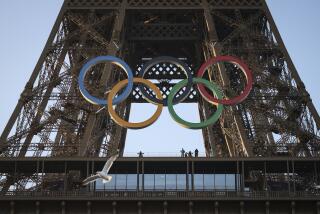ROBERT HUGHES: A Critic’s-Eye View of Barcelona
For 22 years, Robert Hughes has been dishing out praise and punishment from his platform as art critic for Time magazine. Marvelously witty, acerbic and shrewd, Hughes has won a hearty following with his astute lampooning and delightful knack for turning a phrase.
The Australian-born writer has also published several award-winning books, including a highly acclaimed history of his homeland, “The Fatal Shore.”
Now Hughes, 53, is taking his skills before the camera, hosting a segment on Barcelona--the site of this year’s Olympic Summer Games--for the public television series “Travels.” The hourlong program airs on the heels of Hughes’ book “Barcelona” (Alfred A. Knopf, $27.50).
Hughes leads viewers on a leisurely tour of the sprawling Spanish port, spicing up the footage with insightful commentary in his sonorous voice. Recently, the critic spent a few days in Los Angeles, where Times Staff Writer Jenifer Warren cornered him for a chat about Barcelona and a few other matters on his mind.
Let’s start with the “Travels” program. Is this an insider’s guide to Barcelona or something more ambitious?
It’s not about what restaurants to eat in or what’s on at the theaters. It tries to give a sense, in the limited compass of an hour, of the city’s history and culture, along with some of the preoccupations of the region’s people.
The city is quite different from that Spain we think of as bullfights and flamenco dancers and people singing to senoritas under rose-trimmed balconies. Barcelona was always a very hard-nosed mercantile city, and a lot of its culture grows out of that industrial base.
I also try to give a sense of the age of the city, of its Gothic past and the way that this inscribes itself in the great buildings. Then there are the people--Catalans, they are called. They have a very strong sense of region and place, regarding themselves as very separate from the rest of Spain.
You’ve also written a new book on Barcelona. What spawned that project?
Barcelona was always a very intriguing city to me, from the moment I first went there at the invitation of a sculptor friend in the ‘60s. Here it was, very big, with a lot of great stuff in it, and yet people didn’t know about it. The people, their culture, seemed so distinctive that I kept going back.
Once, when I was complaining that there were no decent books in English on the city, a friend suggested that I should write such a book myself. And I thought, ‘Well, why not!’
A book is really a guess, you know, a guess that you’re on to a subject interesting enough to carry you through the work without getting bored. It turned out I was.
How will Barcelona work as an Olympic-host city?
That is the $64 question. Nobody really knows. It has always been short of lodging and subject to terrible traffic jams. They’ve done a tremendous amount of work on the infrastructure of the city--highways, underpasses, sewers. The Games have also been a catalyst for a great remaking of the waterfront, where they have cleaned up the rusting railway yards and other messes.
But will there be enough hotel rooms? Most people are just crossing their fingers and hoping for the best.
As an art critic, you’ve had a front-row view of the turmoil at the National Endowment for the Arts. What do you make of that battle?
If the NEA goes down it will be a grave loss for American cultural life. The picture given by the conservative polemicists is of these morally denuded liberals handing out vast sums of money to “queers” and feminists and other infestations of American life.
In fact, the NEA grants have had a very important effect in all sorts of communities, benefiting chamber music groups, youth theater, every imaginable project. The real losers if the NEA goes down will be perfectly ordinary people all over America who rely on the NEA to keep their local orchestra on its feet.
Will the NEA survive?
The reason I think it will survive is that there are an awful lot of Republicans out there who do care about cultural matters. Some kind of sanity will prevail, but some babies will be thrown overboard, and what will be thrown overboard, regrettably, will be cutting-edge art.
You’ve written many pieces that blame television for a hefty share of society’s problems. What accounts for this hostility?
Network television in America is mostly a disgrace. It shortens the social attention span. And, by making utterances dissolve into sound bites, it has contributed immeasurably to the amnesia and incapacity for keeping arguments in your head that you see everywhere in this great republic. It produces this situation where a politician has to put across this little snack cookie and, “Chomp!” the electorate eats it. You get temporarily memorable verbal icons replacing intelligent argument and thought.
I probably sound like a prim old fundamentalist, but I am. On the whole I think TV tends to make people stupider and reading makes them smarter.
“Barcelona” airs Sunday at 8 p.m. on KPBS and MOnday at 10 p.m. on KCET.
More to Read
The biggest entertainment stories
Get our big stories about Hollywood, film, television, music, arts, culture and more right in your inbox as soon as they publish.
You may occasionally receive promotional content from the Los Angeles Times.










